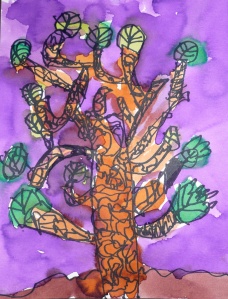 While we generally dislike feeling frightened, if we try to deny our fears they have a way of growing ever larger. For example, if we are afraid of germs, and we give in to our fear, soon we are afraid of touching others, next we may become afraid of people in general, then of crowded places, until we become a prisoner of our fears, which can generalize into pervasive dread and isolation. We then spend so much effort “staying safe” that our so-called lives become a sort of living death.
While we generally dislike feeling frightened, if we try to deny our fears they have a way of growing ever larger. For example, if we are afraid of germs, and we give in to our fear, soon we are afraid of touching others, next we may become afraid of people in general, then of crowded places, until we become a prisoner of our fears, which can generalize into pervasive dread and isolation. We then spend so much effort “staying safe” that our so-called lives become a sort of living death.
From there we may over-protect our children, sheltering them from all pain and danger, only to later realize that they are utterly unequipped for the world. We wake up to realize that we’ve become helicopter parents, and that our kids resent their dependency on us and that we also resent their dependency on us. And we wonder where we went wrong? Perhaps it was in not recognizing our fears and coming to better terms with them.
Our kids may intuit our overly fearful unhappiness and rebel, taking all sorts of risks just to avoid becoming us; but in their oppositionality they merely become the opposite of us, instead of their own authentic Selves. For that to unfold, we benefit from secure attachment and the confidence to take appropriate risks, learn and grow to trust ourselves—to follow our heart-minds, or our higher Selves, and not be cowed by our reptilian, fear-based, brains.
The Privilege of Parenting is more interested in helping parents develop a secure attachment with themselves, and then facilitating this in their children, than it is striving to become another “expert” ready to tell others how to live or parent. We all love our kids; we all struggle as human beings. If we deepen our understanding of our children and ourselves, not only will the “right” answers be at our fingertips, flowing organically from our own hearts, but also we will find that we have the patience, energy and compassion to actualize our best Selves—as parents, and in everything else we try.
Of course fears have their value, like sugar, but too much of anything leads to problems. And then problems leads to “fixing problems,” and most women will gladly tell you that they would prefer it if the men in their lives listened more and “fixed” less. Most men likewise prefer to be heard than corrected and schooled. Good teachers draw the best from within us; this calls for patience, trust and high expectations. So, set your own expectation that you can become your best Self—believe it; be your own teacher and pupil.
In the spirit of learning together, and empowering parents in the service of kids, I strive to make this blog useful by attempting to intuit what may be on the minds, conscious and unconscious, of parents. If I get it right, you may feel more understood and that may help. If I get it wrong, or miss things that are on your mind as a reader, please communicate and I will try to listen, and then reflect your views and concerns to other parents who may feel understood if some of their previously unarticulated thoughts, fears and frustrations (and joys, gratitude and sense of life as living poetry) find expression through our collaborative efforts.
Yesterday we explored the value in listening to our fears. Today we circle back to the notion that parents “mirror” children. This means that if we are sad, baby thinks she is depressing. And if we are frightened, worried and anxious, our children are at risk of coming to believe that they are scary, unsafe and nerve-wracking to parent. This sets a poor foundation for trusting and nourishing relationships in the future, as a child raised in this vibe may fear that they are just too much for others. To compensate, we may don a false mask as the “easy” person becoming a “pleaser” who caters to others, but who is never satisfied or pleased themselves. When parents are childlike and dependent, kids grow up too fast and become “parentified children” (an idea found in systems theory dating back to the 70’s and the work of Gregory Bateson, Virginia Satir and others).
Conversely, if parents project their fears into their children, then the parents are triggered to overprotect and smother (mindlessly trying to protect their own inner children from the harm that they already incurred in their own childhoods; futilely bolting the doors against an anxiety that has long-ago entered their house of self). This is an unconscious process, in which the parent believes with all their conscious heart and soul that they are helping their child. The most insidious aspect of this dynamic is the guilt of parents who simply cannot stand the notion that their parenting might have inadvertently hurt their children. It’s best to understand that we all mess up. Maybe what we really need to do is get less defensive, apologize and move forward. If guilt provokes us to change behavior, it is productive. We get stuck in an endless loop of beating ourselves up and not changing our consciousness or behavior, we are a drag.
Let’s dedicate to today to serving our personal intentions by being more conscious of our fears, and of their impact on our children, cultivating consciousness in the service of our kids—and all kids.
Namaste, Bruce


